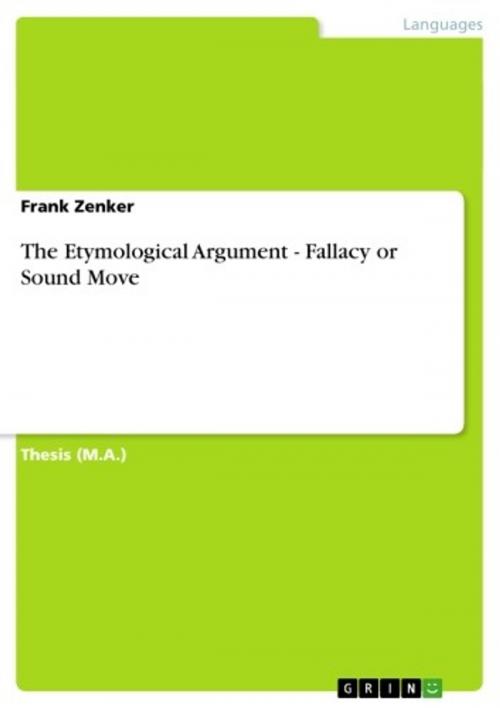The Etymological Argument - Fallacy or Sound Move
Fallacy or Sound Move
Nonfiction, Reference & Language, Language Arts, Public Speaking, Rhetoric| Author: | Frank Zenker | ISBN: | 9783638144018 |
| Publisher: | GRIN Publishing | Publication: | September 26, 2002 |
| Imprint: | GRIN Publishing | Language: | English |
| Author: | Frank Zenker |
| ISBN: | 9783638144018 |
| Publisher: | GRIN Publishing |
| Publication: | September 26, 2002 |
| Imprint: | GRIN Publishing |
| Language: | English |
Thesis (M.A.) from the year 2002 in the subject Rhetoric / Elocution / Oratory, grade: 8,5 von 10, M.A. with honours, University of Amsterdam (Int. School for Humanities & Social Sciences), course: Speech-Communication, Argumentation-Theory and Rhetorics, 44 entries in the bibliography, language: English, abstract: This text is concerned with the place of etymology as an argument in a critical discussion according to the Pragma-Dialectic model. My thesis is a criticisms of the etymological argument for an ontological presupposition of essences beyond the observable real world that seem necessarily implied in forwarding etymology as a means to formulate and justify definitions of key-terms. The research spells out criteria of fallaciousness and, eventually, suggest that all essential definitions are to be avoided or mitigated so that no ontological import takes place, but the essential method instead assumed as functionally equivalent to the Aristotelian method of defining according to the genus proximum and differentia specifica scheme to get rid of the ontological problem, at least. The criticism of essentialism used is the German-Englishman Karl Popper's forwarded in The Open Society which is published, in English, at the end of the second world war in criticism of the European totalitarian political excesses at that time. It is a modern criticism that I bring in relation to the comparably relevant, yet somewhat older postulation of an arbitrary relation between the linguistic form and its meaning by the French linguist Ferdinand Saussure in his Course in General Linguistics, published by students in 1915. Popper's criticism is, in his full intent, also a criticism of the methods of 20th century Social Sciences and Humanities in contrast to the Natural Sciences. I try to give this discussion some room but will disappoint anyone who reads the text for a statement on the methods debate. Its centrality is pointed out, though. I make ample use of notes that distract a smooth reading substantially, especially as I decided to use endnotes. The first reading should be exercised in complete disregard of the footnotes. This way, you get what is in the text. The second should include the endnotes. This way you get to where I come from and it is the level at which criticism should find its most fruitful soil. 'Essentially, what you do in parliament is talking. Parliament. Look at the French word parler - to talk. There you have it'. From a discussion on a Netherlands Radio Station, July 2002 [...]
Thesis (M.A.) from the year 2002 in the subject Rhetoric / Elocution / Oratory, grade: 8,5 von 10, M.A. with honours, University of Amsterdam (Int. School for Humanities & Social Sciences), course: Speech-Communication, Argumentation-Theory and Rhetorics, 44 entries in the bibliography, language: English, abstract: This text is concerned with the place of etymology as an argument in a critical discussion according to the Pragma-Dialectic model. My thesis is a criticisms of the etymological argument for an ontological presupposition of essences beyond the observable real world that seem necessarily implied in forwarding etymology as a means to formulate and justify definitions of key-terms. The research spells out criteria of fallaciousness and, eventually, suggest that all essential definitions are to be avoided or mitigated so that no ontological import takes place, but the essential method instead assumed as functionally equivalent to the Aristotelian method of defining according to the genus proximum and differentia specifica scheme to get rid of the ontological problem, at least. The criticism of essentialism used is the German-Englishman Karl Popper's forwarded in The Open Society which is published, in English, at the end of the second world war in criticism of the European totalitarian political excesses at that time. It is a modern criticism that I bring in relation to the comparably relevant, yet somewhat older postulation of an arbitrary relation between the linguistic form and its meaning by the French linguist Ferdinand Saussure in his Course in General Linguistics, published by students in 1915. Popper's criticism is, in his full intent, also a criticism of the methods of 20th century Social Sciences and Humanities in contrast to the Natural Sciences. I try to give this discussion some room but will disappoint anyone who reads the text for a statement on the methods debate. Its centrality is pointed out, though. I make ample use of notes that distract a smooth reading substantially, especially as I decided to use endnotes. The first reading should be exercised in complete disregard of the footnotes. This way, you get what is in the text. The second should include the endnotes. This way you get to where I come from and it is the level at which criticism should find its most fruitful soil. 'Essentially, what you do in parliament is talking. Parliament. Look at the French word parler - to talk. There you have it'. From a discussion on a Netherlands Radio Station, July 2002 [...]















